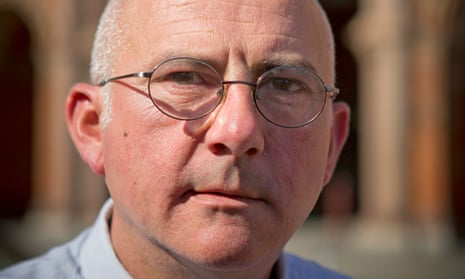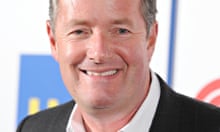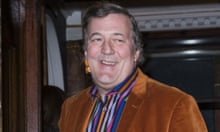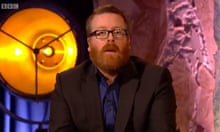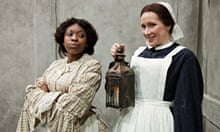Andrew Norfolk, the Times reporter responsible for exposing Rotherham’s child sex scandal, recoils when the Guardian suggests coming to its London office for an interview. Not because he is based in Leeds, or works for a rival, but because “it would make me feel as though I was begging to be interviewed, which is certainly not the case”.
In an age in which journalists are advised to see themselves as a brand, a voice or a personality, Norfolk is very much an accidental superstar. His investigation into child sexual exploitation won the Paul Foot and Orwell prizes for journalism last year and led to the recent inquiry which found 1,400 children were abused over a 16-year period. Yet he has never promoted any of his stories online, refuses to use Facebook and signed up to Twitter for two weeks only as part of a deal with his bosses to watch the 2010 World Cup final in South Africa. The last ever tweet from @threelionsSA reads, “End of the adventure, Jo’burg airport,” and is dated July 2010.
He chain-smokes Marlboro Gold while working in a “hovel of a sort-of study in what was once the third bedroom”, and describes himself as the “slowest writer in the world”. When we eventually meet in a grand London hotel, we are barred from the main lobby because of an event advertised with huge posters shouting “Bertelsmann – innovation and creativity”. “I’m not from the London media world,” he says, before trying to explain his reluctance to share his opinions by stressing his role as “reporter, not columnist or opinion-former”.
A spry man with close-cropped hair and darting eyes in wire-framed glasses, Norfolk has a fretful look but, during an interview that lasts almost three hours, he is both open and thoughtful about a story that he worked on full-time for more than three years, the effect it has had on him and why the media needs to look outside London for more stories. At a time when the established media world came in for so much opprobrium during Scotland’s referendum, he is that increasingly rare thing, an old-school shoe-leather reporter; his investigation of what appeared to be a local issue ended up not only on national front pages and news bulletins but questioning accepted truths and holding the powerful to account.
He admits that when he first heard details of the allegations by mainly white girls against largely British-Pakistani perpetrators – during a speech by Labour MP Ann Cryer – he didn’t want to follow it up. “Immediately I thought this is a dream story for the far right,” he says. Yet as soon as he started investigating in the autumn of 2010 he knew he would have to report on it: “We found clear evidence of a crime pattern that was not being acknowledged or addressed and which was having the most devastating impact on some of the most vulnerable, innocent people in our society.”
After the first splash and four-page special appeared in January 2011, prompting the government inquiry, he was attacked both by those who felt he was unfairly targeting a minority community when the majority of sexual crime is carried out by white men and by those on the far right who felt he should write more about anti-white racism, two of whom wrote to tell him they wished him dead.
Norfolk still appears slightly bemused by the reaction. “In the way most white men don’t abuse their daughters and most priests don’t abuse choir boys, not all Kashmiri men behave like this,” he says. The police, he believes, while fearful of appearing racist, were guilty of double standards. “It wasn’t as though they weren’t going after [these men] for every other kind of offence … but over this sexual pattern there was trepidation.”
After that initial splash, Norfolk thought it was a “job well done” and he would move on. But his then editor James Harding, now director of BBC News, insisted that he work on the story full-time and continued to encourage him, as does the present Times editor John Witherow. The support was “unprecedented”, he says, especially now that “it’s unusual for a reporter to get three months for a story, especially one that doesn’t add to your sales”. Norfolk, who worked in the London office for a miserable two years before going back to Leeds in 2003, has made a career of writing about people he describes as “not typical Times readers”.
His first big story for the paper was about a medical insurance scam involving retired miners. Asked about his politics, this Kent-born son of a private school headmaster says it’s his own business before adding that “the only representative roles” he’s ever had were sports editor of his university paper and a National Union of Journalists role in his first job in Scarborough.
Once the criminal trials were over, Norfolk started work on a story that did involve the Times’s core constituency, child abuse at some of the UK’s leading independent boarding schools, published in January this year. He was overwhelmed by the response. “From working with one or two families, suddenly there were dozens and dozens of men willing to talk about what had happened to them,” he says.
It seems fair to infer that the stories he has heard over the last four years – from girls unable to have children because of the number of men they were forced to sleep with before reaching maturity, men who have never told anyone about the abuse they suffered and how bad it still makes them feel – have had a profound impact on him. He says there is a limit to how many personal accounts of childhood abuse an untrained person can safely absorb, and that he may be reaching it. “I have an incredible admiration for people who make helping abuse victims their life’s work but I don’t have that capacity, I realise.”
For the first time, he has found that activities which previously offered a reliable escape from the darkness of the story – football and TV drama such as The West Wing and The Sopranos – are failing to do so. Nor does he anticipate becoming a campaigner or public speaker about child sexual exploitation. “My job is to write news stories. I think the best way I can help is to carry on working as a journalist.”
Despite all his recent success, his happiest times were on his first newspaper job at a local paper. Explaining his disinclination then to follow the traditional career path of moving to London, he says: “I didn’t have an ambitious bone in my body in terms of making it to a national newspaper.”
In London to be interviewed for a TV documentary on multiculturalism, he is full of admiration for some new recruits to the profession, but shares concerns that the problems of regional papers have led to an increasing number apeing political careers – private school, Oxbridge, policy wonk, power – without ever being junior reporters, away from the capital. “It’s very old-fashioned but I also think it’s important to have a few years where, if you screw up, people can walk into your office and let you know about it.” As chief investigations reporter, he is ironically no longer a regional correspondent. The Times employs just one in England, based in the south-east.
I ask him what’s next, thinking he may be mulling offers to lecture or write a book, but Norfolk, ever the hack, is thinking of his next news story. “And that’s not something I’m going to share with the Guardian.”
Curriculum vitae
Age 49
Education Kent College, Canterbury; Ashville College, Harrogate. Durham University (English)
Career 1989 reporter, Scarborough Evening News 1995 reporter, Yorkshire Post 2000 reporter, the Times 2002 north-east correspondent 2012 chief investigative reporter
